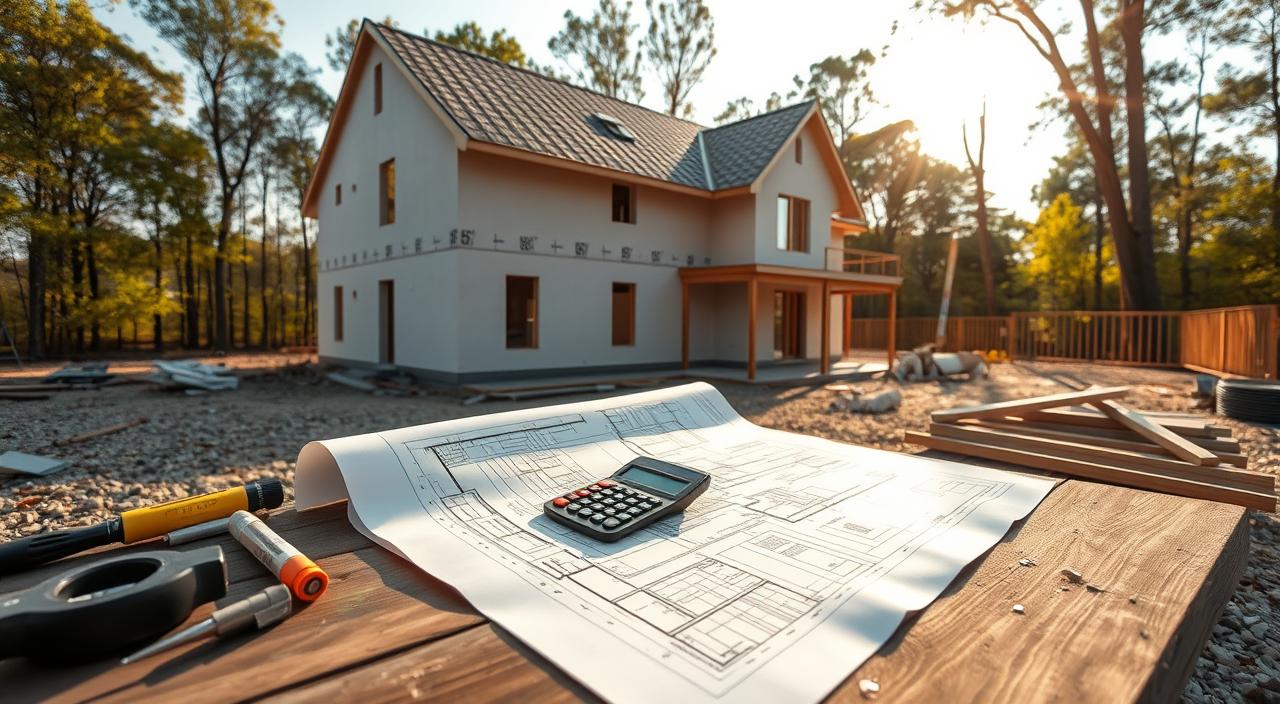Did you know FHA construction loans only need a 580 credit score? If you put down 10 percent, it’s even lower, at 500. This makes FHA construction loans very accessible for building your dream home.
Building a home instead of buying one? An FHA construction loan might be what you need. It’s insured by the Federal Housing Administration (FHA) and offered by FHA-approved lenders. It covers the cost of building, including land, materials, and labor.
Key Takeaways
- FHA construction loans can finance the full cost of building a new home, including land, materials, and labor
- FHA construction loans have a low 3.5% down payment requirement for borrowers with credit scores of 580 or higher
- FHA construction loans typically last for one year during the construction phase, with payments made directly to the contractor
- FHA construction-to-permanent loans allow borrowers to convert the construction loan to a regular FHA mortgage after completion
- FHA 203(k) loans provide financing for both home purchase and renovation costs
What is an FHA Construction Loan?
An FHA construction loan is a mortgage insured by the Federal Housing Administration (FHA). It helps borrowers finance a new home’s construction. It covers costs from the architect’s fee to the certificate of occupancy. After the home is built, the loan turns into a long-term FHA mortgage.
Types of FHA Construction Loans
There are two main types of FHA construction loans:
- FHA Construction-to-Permanent Loan: This loan finances a home’s construction, including land purchase. It then converts to a regular FHA mortgage after construction is done. This is a single-close loan, avoiding the need for two separate loan closings.
- FHA 203(k) Rehabilitation Loan: This loan finances buying an existing home and needed repairs. There are two types: a standard 203(k) for big renovations and a limited 203(k) for smaller projects. Both options let you get one loan for buying and fixing up a home.
Both FHA construction loans are insured by the Federal Housing Administration. They are popular for borrowers with lower credit scores and smaller down payments.
How Does a One-Time Close FHA Construction Loan Work?
The FHA One-Time Close Construction Loan is a great choice for those building a new home. It combines construction financing and a permanent mortgage into one loan. This means no need for a second loan application and closing.
The process starts with a short-term construction loan. Once the home is built, it turns into a standard mortgage. This makes the loan process simpler and more efficient.
This loan offers several benefits. You only need a 3.5% down payment. It also allows for flexible debt-to-income ratios up to 50%. Plus, you can use land equity for the down payment.
Sellers and builders can help with up to 6% of the closing costs. This makes it easier to get started on your new home. However, this loan is only for single-family homes, not multi-unit properties.
To qualify, you need a minimum credit score of 620. You must also follow FHA’s loan requirements. This includes a 5% construction contingency and a quick start to the permanent mortgage.
In summary, the FHA One-Time Close Construction Loan is a great option. It’s easy to get and offers flexibility and savings. It’s perfect for those building their dream home.
FHA Construction Loan Requirements
To get an FHA construction loan, you must meet certain criteria. You need a credit score of at least 580. If your score is 500 or higher, you can qualify with a 10% down payment. Your debt-to-income ratio should not be over 43%, with some exceptions.
The FHA also has loan limits based on the county. You’ll need to pay upfront and annual mortgage insurance premiums.
Loan Eligibility Requirements
FHA construction loans have extra rules. You must show solid proof of your construction or renovation plans. This includes details about the contractor you’ll use.
The builder and general contractor must also meet FHA standards. This is for the loan to be approved.
- Minimum credit score of 580, or as low as 500 with a 10% down payment
- Debt-to-income (DTI) ratio no more than 43 percent
- Down payment of 3.5 percent (with a credit score of at least 580) or at least 10 percent (with a credit score between 500 and 579)
- Loan limits within the FHA loan limits for the year
- Upfront and annual FHA mortgage insurance premiums
- Primary residences only
- Satisfactory documentation detailing the construction or renovation project
- Contractor must meet FHA qualifications, including licensure, liability insurance, and a minimum of two years of experience building homes
Understanding FHA construction loan requirements can be tricky. But knowing these key points can help you decide if this loan is right for your project.
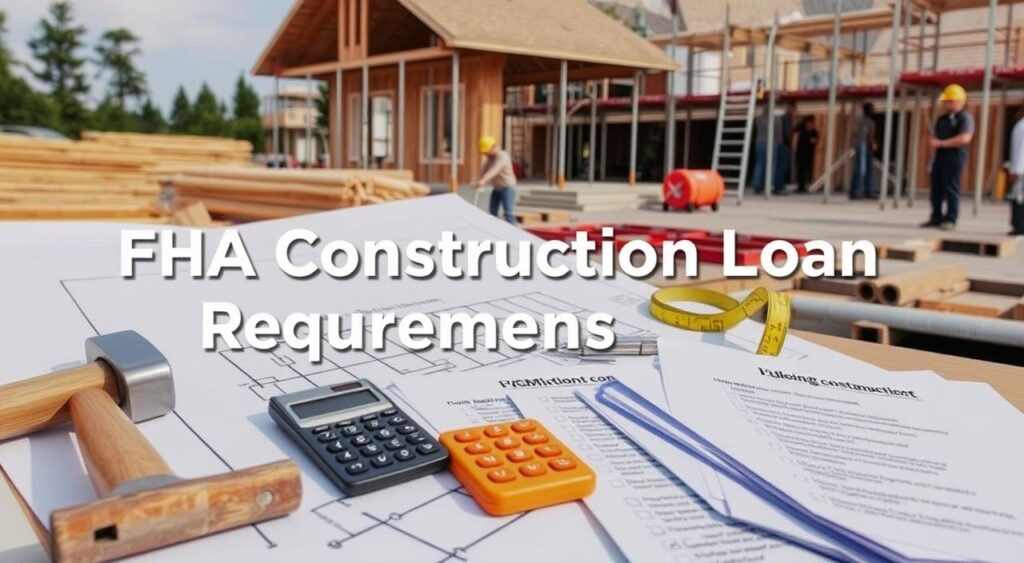
Finding Lenders for FHA Construction Loans
Finding the right fha approved lenders is key when you need an FHA construction loan. The FHA insures these loans, but not all FHA lenders offer construction financing. Start by looking at the U.S. Department of Housing and Urban Development’s (HUD) list of lenders. You can filter for 203(k) lenders if you’re looking for that specific FHA construction loan.
You can also search for fha construction lenders in your area. Local banks, credit unions, and mortgage companies often have experience with FHA construction loans. It’s important to compare rates, fees, and loan terms from different lenders to find the best one for you.
- FHA-approved lenders are not automatically FHA construction lenders, so it’s crucial to inquire about their expertise in this area.
- Lenders with a track record of successful FHA construction loan programs may be more likely to provide a smooth and efficient experience.
- Consider factors such as customer service, communication, and responsiveness when choosing an FHA construction loan provider.

By researching and evaluating potential fha construction lenders, you can find an FHA construction loan that fits your needs and budget. The lender you choose is crucial for the success of your homebuilding journey.
FHA Construction Loan Do You Pay During Construction
FHA construction loans have a different payment plan than regular mortgages. During the building phase, you only pay interest on the loan amount given out. This is called the “interest-only” phase.
Interest Payments During Construction Phase
FHA construction loans help finance new homes. They are given out in stages, or “draws,” as the home is built. A lender checks the project at each stage to release more funds.
For about 12 months, you only pay interest on the fha construction loan interest payments given out. This makes monthly costs easier to handle while the home is being built.
After the home is finished, the loan turns into a regular mortgage. Then, you start making payments on both the principal and interest. The fha construction loan draw schedule shows when and how much of the loan is given to the builder.
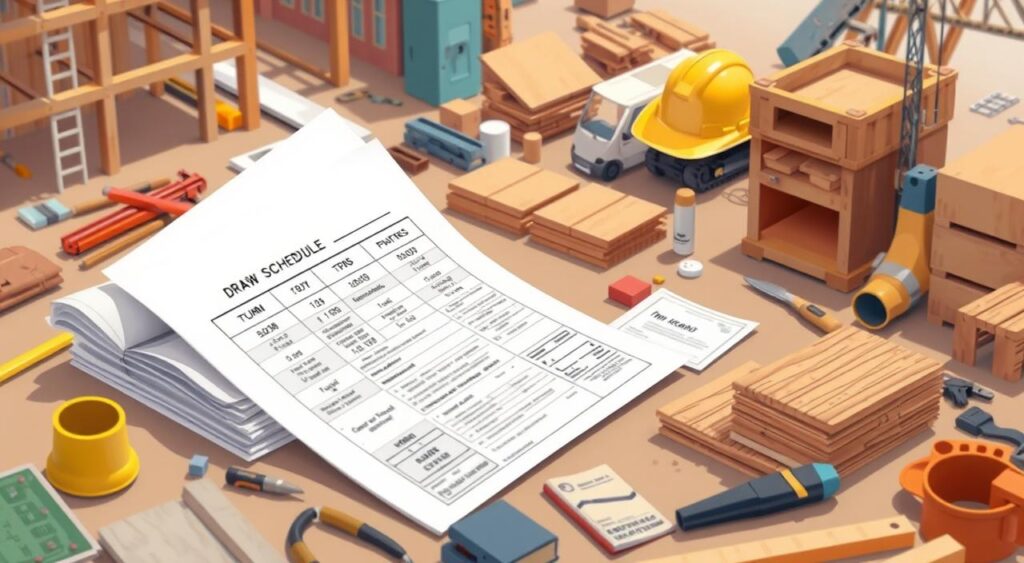
With interest-only payments during construction, you can focus on your dream home without high monthly costs. This flexibility is a big plus of FHA construction loans.
Alternatives to FHA Construction Loans
FHA construction loans are a good choice for building or renovating a home. But, there are other options too. Conventional construction loans and renovation loans are two popular alternatives.
Conventional Construction Loans
Conventional construction loans are another option. They often require a down payment of 20% to 30% of the construction costs. You’ll also need a high credit score, usually 680 or higher, to qualify.
However, conventional loans might have lower interest rates. They also don’t require mortgage insurance premiums. This can save you money over time.
Renovation Loans
Renovation loans, like the HomeStyle Renovation loan, fund both the home purchase and renovation costs. They’re great for those buying a fixer-upper or making big improvements to a current home. Renovation loans might allow for a lower down payment, up to 75% of the home’s value after renovations.
They can be used for investment properties or homes you live in. The right alternative to an FHA construction loan depends on your financial situation and project. Talking to loan officers can help find the best option for you.
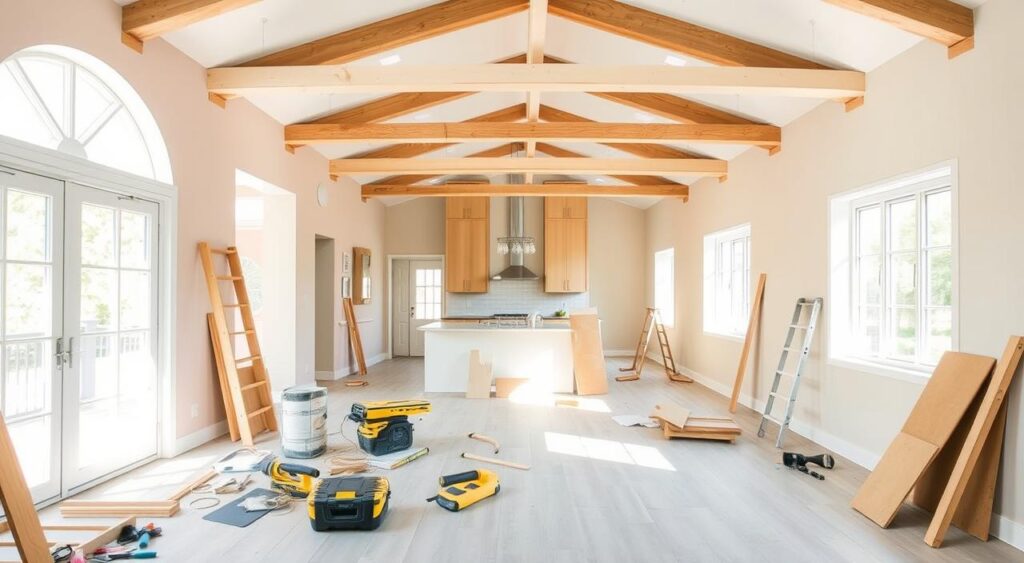
The Construction Process with an FHA Loan
The FHA construction-to-permanent loan process is designed to make your dream home a reality. First, you’ll need to qualify with an approved lender. Your builder and general contractor must also meet FHA standards.
Next, your home design plans will be reviewed for FHA compliance. After that, you can close on the loan and start building.
Choosing Land and a Builder
In the FHA construction loan process, you have several land options. You can use your own vacant land, buy land with an existing loan, or place land under contract. Before finalizing your plans, get prequalified or preapproved with an FHA-approved lender.
This ensures your FHA construction loan land requirements are met.
Getting Pre-Approved
After agreeing on land and builder contracts, an appraisal can be ordered. It determines the property’s forecasted value based on a completed home. This pre-approval is key to securing FHA financing and moving forward.
Loan Closing and Construction Begins
With everything approved, you can proceed to the loan closing. The construction loan funds are placed in an escrow account. Half of the amount is disbursed upfront, and the other half upon project completion.
Then, your builder can start constructing your new home. FHA inspectors will oversee the process.
Inspections and Draws During Construction
When you get an FHA construction loan, the money is kept in an escrow account. Your contractor will ask for draws as each part of the project is done. They will check the work to make sure it meets FHA standards.
The first money from the loan is given at closing. It can be used to pay for the land and give a start-up payment to the contractor. After that, the builder asks for money directly to their account for each part of the construction.
The last payment to the contractor is made when the construction is finished. This might need an appraisal and a title company check before the money is given. Remember, FHA construction loans rarely give cash back to borrowers, except in special cases.
The loan amount for a construction loan depends on the Loan to Cost Ratio. This ratio looks at the land price, construction costs, and the home’s future value. Construction loans are short, lasting from 6 to 18 months.
During construction, there are usually 5 to 7 draws from the escrow account. The loan limits for FHA construction loans can go up to $3,000,000. Up to 90% of the home’s future value can be financed with this loan.
Throughout the construction process, Workers’ Compensation Insurance is needed in almost all states. To get an FHA construction loan, you need architectural plans, a cost breakdown, contractor details, and a signed contract.
In the end, the FHA construction loan inspections and draws check if the project is going well. They make sure the final home meets FHA standards before the loan is fully given out.
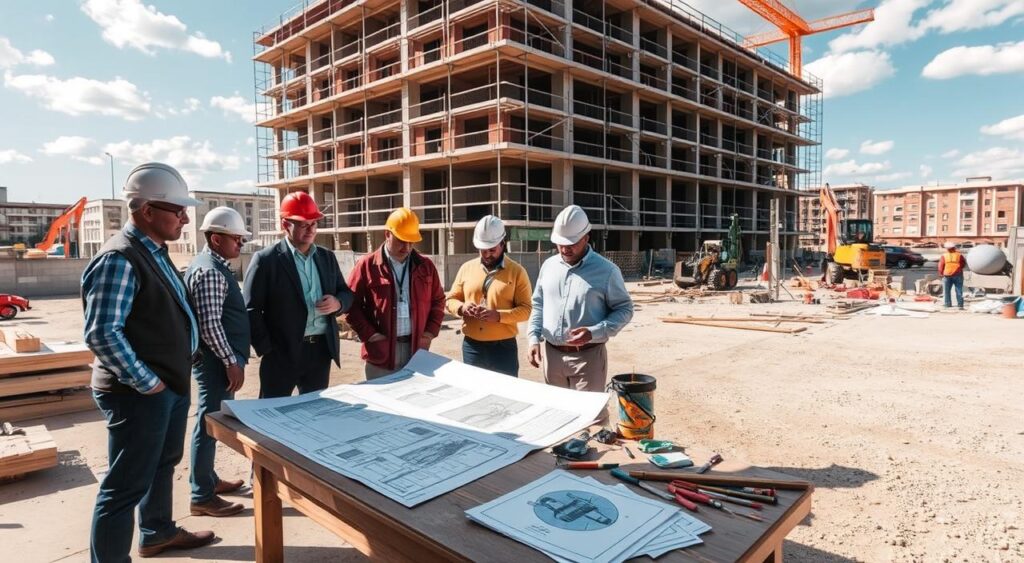
Converting to a Permanent Mortgage
After the construction is done and the home is inspected, the FHA construction loan turns into a permanent mortgage. At this time, the borrower starts making regular payments, just like a usual mortgage. The fha construction loan is now a permanent mortgage, giving the homeowner long-term financing for their new home.
The process of converting is easy. The lender checks the final construction costs and adjusts the loan amount. The borrower then locks in the interest rate and starts making monthly payments on the permanent mortgage. This one-time close saves time and money for the homeowner by avoiding a separate refinancing.
- Completion of Construction: Once the construction is finished and the home passes the final inspection, the FHA construction loan is ready to be converted.
- Loan Amount Adjustment: The lender will review the final construction costs and adjust the loan amount accordingly.
- Interest Rate Lock: The borrower will lock in the interest rate for the permanent mortgage at this stage.
- Monthly Payments: The borrower will begin making regular principal and interest payments on the permanent mortgage.
The smooth transition from the fha construction loan to the permanent mortgage is a big plus. Homeowners get the benefit of a single loan process. They also make sure their long-term financing needs are covered.
Pros and Cons of FHA Construction Loans
FHA construction loans have both good and bad sides. Knowing these can help you decide if an FHA loan is right for you.
Advantages of FHA Construction Loans
- Lower down payment requirements: FHA construction loans need a down payment as low as 3.5%. This makes it easier for people with less money to buy a home.
- Accommodating credit score standards: You only need a credit score of 580 to get an FHA construction loan. With a 500 score, you can still get a loan if you put down 10%.
- One-time closing process: FHA construction-to-permanent loans let you lock in your interest rate early. This saves you money on closing costs.
- Flexible debt-to-income (DTI) ratios: FHA loans allow a DTI of up to 43%. This is higher than the 36% limit for most conventional mortgages.
Disadvantages of FHA Construction Loans
- Mortgage insurance premiums: FHA loans require a 1.75% upfront mortgage insurance premium. You also have to pay an annual premium. This can increase your loan’s cost a lot.
- Primary residence requirement: FHA construction loans are only for your main home. You can’t use them for investment properties or vacation homes.
- Strict property requirements: FHA loans have strict rules for the property. It must be in an FHA-approved area and meet certain inspection criteria.
The good and bad points of FHA construction loans depend on your financial situation and goals. By looking at both sides, you can decide if an FHA loan is right for your new home.
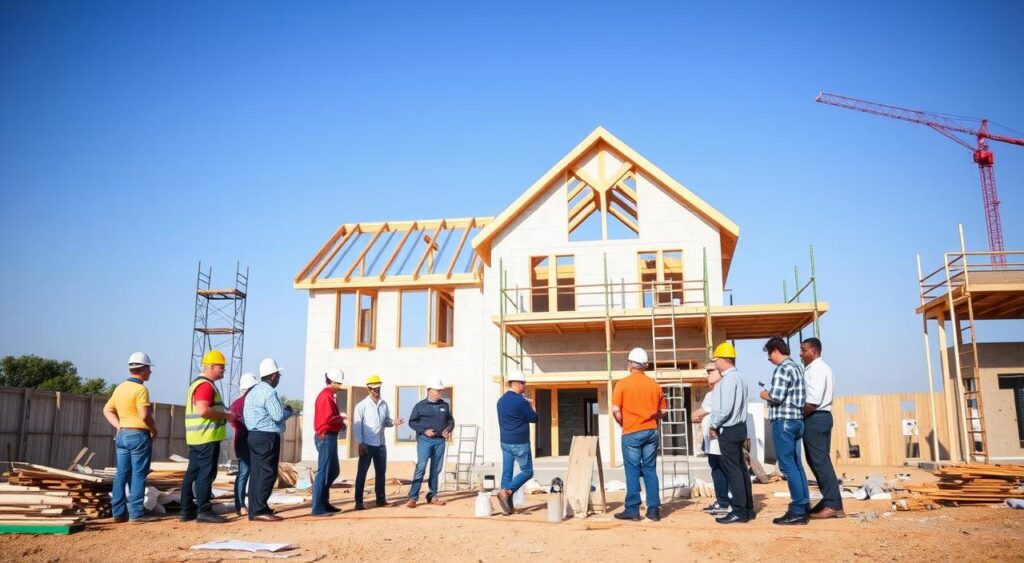
Eligibility for an FHA Construction Loan
To get an FHA construction loan, you must meet certain criteria. First, you need to meet the standard FHA loan requirements. This includes a minimum credit score of 580 (or 500 with a 10% down payment). Your debt-to-income ratio should not be higher than 43%.
The home being built or fixed up must be your primary residence. It also needs to be in an FHA-approved area.
The loan amount for an FHA construction loan can’t go over the FHA limits for the county. This keeps the loan within FHA’s rules and limits.
Key Eligibility Requirements
- Minimum credit score of 580, or 500 with a 10% down payment
- Debt-to-income ratio not exceeding 43%
- Down payment of at least 3.5% (or 10% for credit scores between 500-579)
- Home must be the borrower’s primary residence
- Property must be located in an FHA-approved area
- Total loan amount cannot exceed FHA loan limits for the county
Meeting these requirements lets you enjoy FHA construction loan benefits. These include lower down payments, flexible credit rules, and a simpler loan process. This combines construction and permanent financing into one loan.
Conclusion
FHA construction loans are a special way for people to build or fix up their dream home. They have lower credit score and down payment needs than regular loans. This makes it easier for people to own a home.
But, FHA loans come with extra costs like mortgage insurance. It’s important for borrowers to know this before they decide.
Before choosing an FHA construction loan, borrowers need to think about their finances and plans. They should also consider their long-term goals. Knowing the details of FHA loans helps people make the best choice for their situation.
With the right help, FHA loans can help turn a dream home into reality. They offer a chance to build or fix a home in a way that fits your budget.
The demand for FHA construction loans is growing. In February 2024, construction loan volume hit $489.62 billion, according to the FDIC. This shows that more people are looking for flexible and easy-to-get loans.
By keeping up with the latest in construction loans, homebuyers can feel confident. They can reach their dream of owning a home with FHA construction loans.

